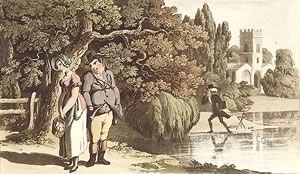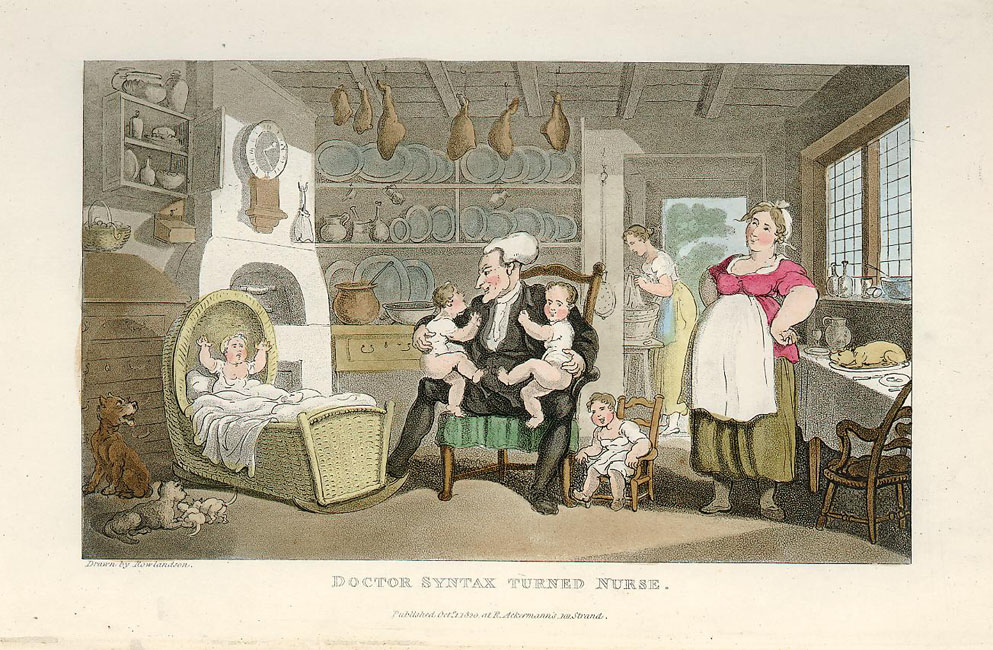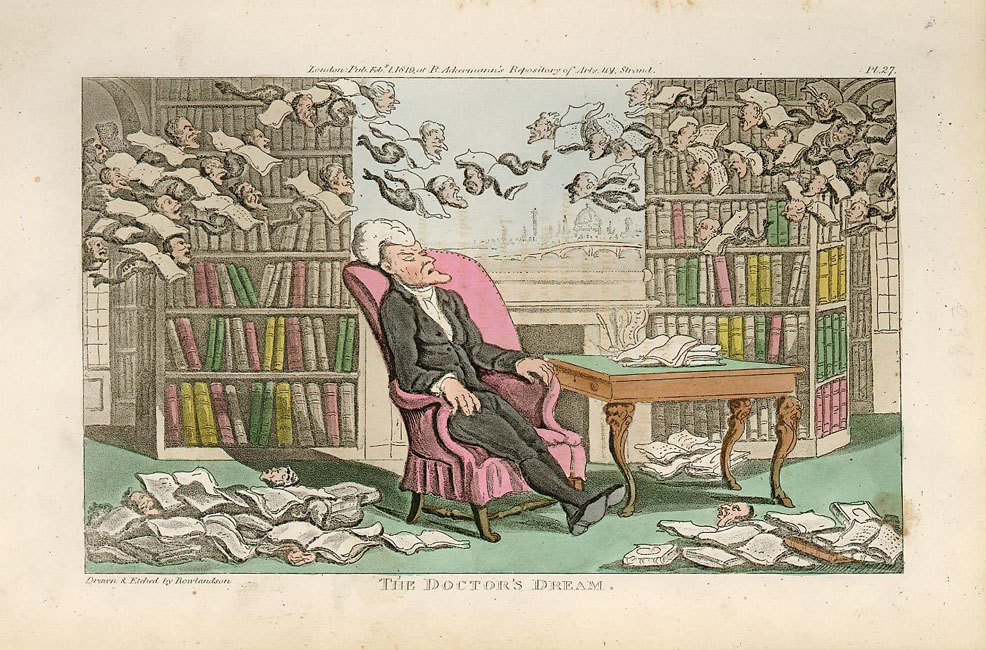The discovery of Dr. Syntax
« previous post | next post »
 On the wall behind the table where I usually sit to blog, there's a framed print, shown in faded miniature on the right. The title below the picture is "Dr. Syntax Making a Discovery".
On the wall behind the table where I usually sit to blog, there's a framed print, shown in faded miniature on the right. The title below the picture is "Dr. Syntax Making a Discovery".
But there's not a subjunctive or a preterite in sight. The couple in the foreground, though perhaps engaged in discovery, don't look very intellectual. The old geezer in the background seems to be examining a tree — but it's a willow, not a representation of constituent structure or grammatical relations. What gives?
We can get the basic historical context from Mark Bryant, "Dr. Who? The First Cartoon Character", History Today, July 2007:
MANY PEOPLE, faced with the question 'Who was the first popular fictional cartoon character?' might assume this to be Walt Disney's Mickey Mouse, created in 1927. However, before Mickey came Bonzo the Dog and Felix the Cat, and earner still were Ally Sloper and Max and Moritz (both from the 1860s), Brown, Jones and Robinson of Punch (1850s) and Honoré Daumier's Ratapoil (1830s). However, it is now generally acknowledged that the first ever popular fictional cartoon character was created in 1809 — more than a century before Mickey Mouse. A scrawny and eccentric elderly clergyman/schoolmaster, he was hugely successful, spawning many imitators and even creating the first ever market for tie-in merchandise. His name was Dr Syntax and he was the creation of a distinguished British artist who celebrates the 250th anniversary of his birth this year and who is perhaps better known for his topographical watercolours, portraits and political cartoons: Thomas Rowlandson (1757-1827).
From the rest of Bryant's piece, and from the Wikipedia articles on Thomas Rowlandson and William Combe, we can learn quite a bit more. Dr. Syntax was a satire on the Reverend William Gilpin, author of a popular series of illustrated tour journals such as Observations on the River Wye and several parts of South Wales, etc. relative chiefly to Picturesque Beauty; made in the summer of the year 1770. Gilpin invented the concept of the picturesque (defined as "that kind of beauty which is agreeable in a picture"), as well as a particular theory of the principles of picturesqueness. According to Wikipedia,
For Gilpin, both texture and composition were important in a "correctly picturesque" scene. The texture should be "rough", "intricate", "varied", or "broken", without obvious straight lines. The composition should work as a unified whole, incorporating several elements: a dark "foreground" with a "front screen" or "side screens", a brighter middle "distance", and at least one further, less distinctly depicted, "distance". A ruined abbey or castle would add "consequence". A low viewpoint, which tended to emphasise the "sublime", was always preferable to a prospect from on high. While Gilpin allowed that nature was good at producing textures and colours, it was rarely capable of creating the perfect composition. Some extra help from the artist, perhaps in the form of a carefully placed tree, was usually required.
Gilpin also famously suggested that certain things often ought to be removed, such as some of the gable-ends at Tintern Abbey:
A mallet judiciously used (but who durst use it?) might be of service in fracturing some of them; particularly those of the cross isles, which are not only disagreeable in themselves, but confound the perspective.
Jane Austen satirized Gilpin's fashionable principles of the picturesque in Northanger Abbey (written about 1800). The passage where Catherine worries about her ignorance of picturesqueness theory is worth quoting at length:
The Tilneys were soon engaged in another [topic] on which she had nothing to say. They were viewing the country with the eyes of persons accustomed to drawing, and decided on its capability of being formed into pictures, with all the eagerness of real taste. Here Catherine was quite lost. She knew nothing of drawing — nothing of taste: and she listened to them with an attention which brought her little profit, for they talked in phrases which conveyed scarcely any idea to her. The little which she could understand, however, appeared to contradict the very few notions she had entertained on the matter before. It seemed as if a good view were no longer to be taken from the top of an high hill, and that a clear blue sky was no longer a proof of a fine day. She was heartily ashamed of her ignorance. A misplaced shame. Where people wish to attach, they should always be ignorant. To come with a well-informed mind is to come with an inability of administering to the vanity of others, which a sensible person would always wish to avoid. A woman especially, if she have the misfortune of knowing anything, should conceal it as well as she can.
The advantages of natural folly in a beautiful girl have been already set forth by the capital pen of a sister author; and to her treatment of the subject I will only add, in justice to men, that though to the larger and more trifling part of the sex, imbecility in females is a great enhancement of their personal charms, there is a portion of them too reasonable and too well informed themselves to desire anything more in woman than ignorance. But Catherine did not know her own advantages — did not know that a good-looking girl, with an affectionate heart and a very ignorant mind, cannot fail of attracting a clever young man, unless circumstances are particularly untoward. In the present instance, she confessed and lamented her want of knowledge, declared that she would give anything in the world to be able to draw; and a lecture on the picturesque immediately followed, in which his instructions were so clear that she soon began to see beauty in everything admired by him, and her attention was so earnest that he became perfectly satisfied of her having a great deal of natural taste. He talked of foregrounds, distances, and second distances — side-screens and perspectives — lights and shades; and Catherine was so hopeful a scholar that when they gained the top of Beechen Cliff, she voluntarily rejected the whole city of Bath as unworthy to make part of a landscape. Delighted with her progress, and fearful of wearying her with too much wisdom at once, Henry suffered the subject to decline, and by an easy transition from a piece of rocky fragment and the withered oak which he had placed near its summit, to oaks in general, to forests, the enclosure of them, waste lands, crown lands and government, he shortly found himself arrived at politics; and from politics, it was an easy step to silence.
A few years later, it was natural enough for Rowlandson and Combe to satirize Gilpin in their turn, in a series of three immensely popular works, published between 1809 and 1821: the Tour of Dr Syntax in Search of the Picturesque, Dr Syntax in Search of Consolation, and the Third Tour of Dr Syntax in Search of a Wife.
But why Dr. Syntax? This question isn't even raised, much less answered, by Bryant, nor Wikipedia, nor any of the other secondary sources that I've found.
So I turned to the original texts — the rhymed couplets in iambic tetrameter, written by William Combe to tell the story that Rowlandson's aquatints illustrate. And there I found the answer: metonymy. In 1809, everyone hated "syntax", which for them meant the grammatical construal of Latin (and perhaps a little Greek) that was forced on them in "grammar school".
Well, almost everyone — there were enough people who liked it well enough, or at least tolerated it well enough, to study the subject to the point of being rated competent to teach it as the central subject in a "grammar school". And the supply of such low-level church-affiliated schoolmasters was large enough to keep them poor.
Here's how Combe explains the problem, in the opening lines of the Tour of Dr Syntax in Search of the Picturesque:
1 The school was done, the bus'ness o'er,
2 When tir'd of Greek and Latin lore,
3 Good Syntax sought his easy chair, And sat in calm composure there.
4 His wife was to a neighbour gone, To hear the chit-chat of the town;
5 And left him the unfrequent power Of brooding through a quiet hour.
6 Thus, while he sat, a busy train Of images besieged his brain.
7 Of Church-preferment he had none;
8 Nay, all his hope of that was gone:
9 He felt that he content must be With drudging in a Curacy.
10 Indeed, on ev'ry Sabbath-day,
11 Through eight long miles he took his way,
12 To preach, to grumble, and to pray;
13 To cheer the good, to warn the sinner,
14 And, if he got it,—eat a dinner;
15 To bury these, to christen those, And marry such fond folks as chose
16 To change the tenor of their life, And risk the matrimonial strife.
17 Thus were his weekly journeys made,
18 'Neath summer suns and wintry shades;
19 And all his gains, it did appear,— Were only thirty pounds a year,
20 Besides, th'augmenting taxes press To aid expense and add distress:
21 Mutton and beef and bread and beer,
22 And ev'rything was grown so dear;
23 The boys too, always prone to eat, Delighted less in books than meat;
24 So that when holy Christmas came,
25 His earnings ceas'd to be the same,
26 And now, alas, could do no more,
27 Than keep the wolf without the door.
28 E'en birch, the pedant master's boast,
29 Was so increas'd in worth and cost,
30 That oft, prudentially beguil'd, To save the rod, he spar'd the child.
31 Thus, if the times refus'd to mend, He to his school must put an end.
32 How hard his lot! how blind his fate!
33 What shall he do to mend his state?
34 Thus did poor Syntax ruminate.
And 45 lines later, here's how the good doctor explains his plan to the provost of his old college at Oxford:
Provost.—
79 "I hope then my old worthy friend, Your visit here your fate will mend.
80 My services you may command; I offer them with heart and hand;
81 And while you think it right to stay,
82 You'll make this house your home I pray."
Syntax.–
83 "I'm going further, on a scheme,
84 Which you may think an idle dream;
85 At the fam'd Lakes to take a look, And of my Journey make a Book ."
Provost.—
86 "I know full well that you have store
87 Of modern as of classic lore:
88 And, surely, with your weight of learning,
89 And all your critical discerning,
90 You might produce a work of name,
91 To fill your purse and give you fame,
92 How oft have we together sought Whate'er the ancient sages taught!"
Syntax.—
93 "I now perceive that all your knowledge
94 Is pent, my friend, within your college!
95 Learning's become a very bore— That fashion long since has been o'er.
96 A Bookseller may keep his carriage,
97 And ask ten thousand pounds in marriage;
98 May have his mansion in a square, And build a house for countryair;
99 And yet 'tis odds the fellow knows If Horace wrote in verse or prose.
100 Could Dr. Grey in chariot ride, And take each day his wine beside,
101 If he did not contrive to cook, Each year, his Tour into a book;
102 A flippant, flashy, flow'ry style, A lazy morning to beguile;
103 With every other leaf, a print Of some fine view in aqua tint' ?
104 Such is the book I mean to make And I've no doubt the work will take:
105 For though your wisdom may decry it,
106 The simple folk will surely buy it.
107 I will allow it is but trash, But then it furnishes the cash."
Provost.—
108 "Why things are not the same, I fear,
109 As when we both were scholars here;
110 But still I doubt not your success, And wish you ev'ry happiness;
111 Myself, and my whole College tribe, Depend upon it will subscribe."
Here are a couple of other prints from the series (click on the thumbnails for larger versions):


No one today would think of calling a schoolteacher "Dr. Syntax", even in areas where primary schools are still called "grammar schools". I'm inclined to see this as a loss, though an ambiguous one. The image of Syntax in the 18th century may have been largely a negative one, but at least the name recognition was high.